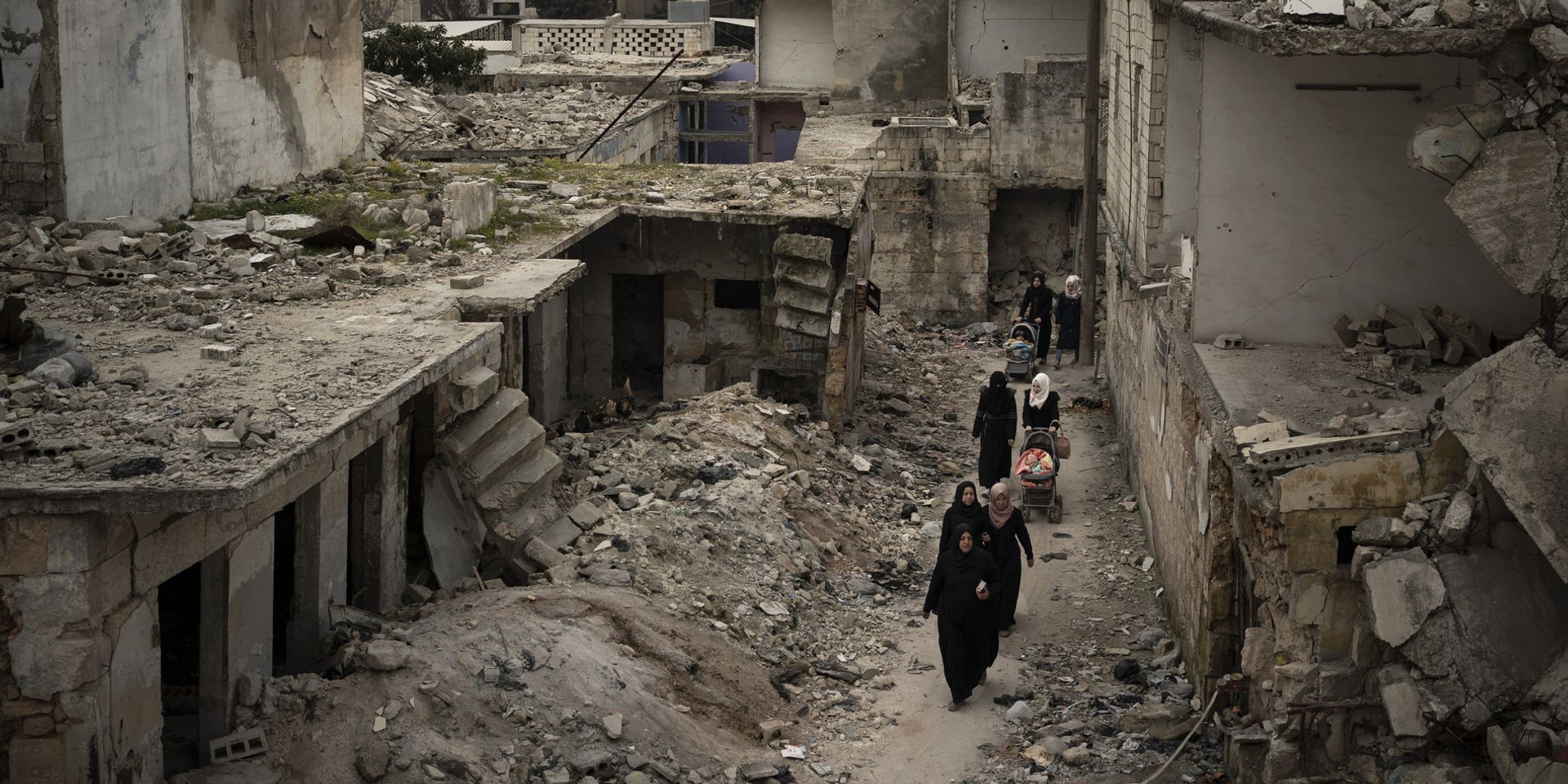Switzerland supports population affected by the Syrian conflict
Over the past decade, the war in Syria has resulted in one of the world's worst humanitarian crises. At the fourth Brussels conference on Supporting the Future of Syria and the Region co-chaired by the UN and the EU on 30 June, Switzerland announced that it would allocate CHF 61 million in 2020 for measures to assist the Syrian people. The international community pledged a total of USD 7.7 billion.

Ongoing hostilities, as well as administrative and operational restrictions, are hampering the implementation of humanitarian actions in Syria. © Keystone
In the tenth year of the Syrian conflict, two thirds of Syria's population are reliant on humanitarian aid. The ongoing armed conflict has led to one of the worst humanitarian crises of our time. Over half a million people, mostly civilians, have been killed and countless others have been injured. Violations of international humanitarian law are frequent: civil infrastructure, including medical and educational facilities, is not spared by the conflict. Millions of people have inadequate access to water, food or medical care.
Six million people have fled the country, five million of whom to Syria's neighbouring countries. Meanwhile, continued fighting and administrative and operational restrictions are hampering the implementation of humanitarian actions.
COVID-19 – an additional risk for millions of people
Syria's humanitarian situation was fragile even before the worldwide COVID-19 crisis, but the global pandemic now poses an additional threat to millions of people. Many of these people have no or inadequate access to clean water, which further exacerbates the risk of epidemics. To prevent the situation getting even worse for the population affected and to renew humanitarian and political support, the UN and EU hold an annual conference in Brussels on the situation in Syria.
At the fourth meeting of the Syria conference, which was held in a virtual format due to COVID-19, Federal Councillor Ignazio Cassis emphasised the importance of a multilateral approach to finding solutions: "We must pool our efforts in order to overcome the humanitarian and political consequences of the Syrian conflict."
Humanitarian aid and promotion of the peace process
In order to work together to achieve this goal and to deliver humanitarian aid to the Syrian population as quickly as possible, the international community pledged USD 7.7 billion at the fourth Syria conference on 30 June. In the presence of Federal Councillor Ignazio Cassis, Switzerland also reaffirmed its commitment, pledging CHF 61 million for the second year running to support people in need in Syria. "We want to support the population affected in Syria and the region. As it is crucial that the aid reaches those in need, we are calling on the Security Council to renew Resolution 2504.”
UN Resolution 2504 expires on 10 July 2020. It allows the UN and its partners to deliver humanitarian aid from outside Syria across the border to northern Syria. “The aid must be delivered across the border to north-western and north-eastern Syria. This is the only lifeline for millions of Syrians," said Ignazio Cassis.
Switzerland not only provides humanitarian aid to the suffering population, but is also intensively involved in peacebuilding, especially in efforts to find a political solution to the conflict. It is host to the UN peace process in Geneva and thus actively supports the search for a political solution.
Switzerland is also committed to respecting and promoting international humanitarian law and human rights, and to combating impunity. In this context, Switzerland, together with the ICRC, organised a discussion on the fate of arrested and missing persons in Syria in the run-up to the conference. Tens of thousands of Syrians are considered missing as a result of the conflict. This represents a great burden for the people concerned, their families and society. The event discussed concrete approaches to support affected families and prevent new cases.
Regional stability in the interest of Swiss foreign and security policy
Despite initial progress at the Geneva peace talks last autumn, the conflict is still awaiting a political solution. "As host state of the UN-led Geneva peace process and through its good offices, Switzerland can help end the stalemate in Syria. We would be prepared to facilitate a resumption of the meetings of the Syrian Constitutional Committee," confirmed Mr Cassis.
At the same time, Switzerland is calling on all parties to comply fully with international humanitarian law, emphasising that there is no military solution to the conflict. Switzerland supports the UN in its process to find a political solution for Syria and thus to relieve the pressure on the population, who have been suffering for years.
As a geopolitical and humanitarian hotspot on Europe's doorstep, the ongoing Syrian conflict also directly affects Switzerland's foreign policy and security policy interests. At the same time, the conflict in Syria is an important issue for the UN Security Council in the area of peace and security, and as such is also crucial to Switzerland's candidacy for a seat on the UN Security Council in 2023–24.
